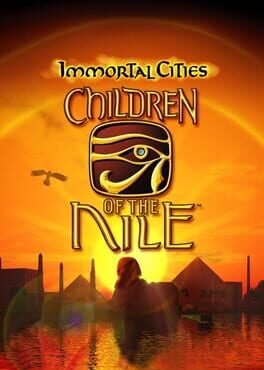

Immortal Cities: Children of the Nile
released on Nov 01, 2004
Create an empire by providing for your people, and make your mark on history. From hunter-gatherers to immortal civilization. Watch your people go about their daily lives; make the right decisions and help them, and society, move forward. Lead your people. Immortal Cities: Children of the Nile is the first and only strategy game where citizens, who behave like living, independent beings, are your primary resource. Power and prestige cannot be purchased, they must be earned. Build your dynasty over 2,000 years. The fate of civilization is in your hands - you must balance your own ambition with your people's needs. The monuments you ask them to build are a testament to the prestige you have among your people.
Reviews View More
This is a game I've been poking at since 2014 and I've finally finished a campaign. I finished all five missions of the Easy campaign and now it's time to reflect on this forgotten classic.
Children of the Nile might be one of the best city builders. It's intricate and balances simplicity with complexity and it's hard to suddenly and drastically screw up your city. Behaviours change at a slow rate and there's a lot of room for error. When you screw up you have plenty of time to recover and even then your citizens are quite forgiving.
I like the emphasis on ignoring problems because they are negligible. I didn't have to deal with this a lot because of my Easy difficulty choices but trying to appease everyone so that their every need is met is not the proper way of playing and probably not possible on higher challenge levels.
There's also the factor that prestige fades over time. Quite slowly, mind, but it does give urgency to everything. You can't rest on a perfectly functional city because the size of your staff is dependent on prestige and if it wanes too much you may lose important priests/overseers/etc. I didn't see much interaction with this system on this playthrough, however.
Aside from finnicky shops, everything in this game is ergonomic and works smoothly. It's unique mechanics set it out from other city builders to this day, and I'd people revisit this one.
Children of the Nile might be one of the best city builders. It's intricate and balances simplicity with complexity and it's hard to suddenly and drastically screw up your city. Behaviours change at a slow rate and there's a lot of room for error. When you screw up you have plenty of time to recover and even then your citizens are quite forgiving.
I like the emphasis on ignoring problems because they are negligible. I didn't have to deal with this a lot because of my Easy difficulty choices but trying to appease everyone so that their every need is met is not the proper way of playing and probably not possible on higher challenge levels.
There's also the factor that prestige fades over time. Quite slowly, mind, but it does give urgency to everything. You can't rest on a perfectly functional city because the size of your staff is dependent on prestige and if it wanes too much you may lose important priests/overseers/etc. I didn't see much interaction with this system on this playthrough, however.
Aside from finnicky shops, everything in this game is ergonomic and works smoothly. It's unique mechanics set it out from other city builders to this day, and I'd people revisit this one.
